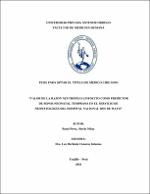Valor de la razon neutrófilo linfocito como predictor de sepsis neonatal temprana en el servicio de neonatología del Hospital Nacional Dos de Mayo

Ver/
Descargar
(application/pdf: 307.2Kb)
(application/pdf: 307.2Kb)
Fecha
2018Autor(es)
Rumi Pérez, Sherly Mitzy
Metadatos
Mostrar el registro completo del ítemResumen
Objetivo: Determinar si la razón neutrófilo linfocito tiene valor predictivo de
sepsis neonatal temprana en el Hospital Nacional Dos de Mayo.
Material y Métodos: Se realizó un estudio observacional, analítico,
retrospectivo de pruebas diagnostica. La población de estudio estuvo
constituida por 213 recién nacidos con sepsis neonatal, de los cuales 83 con
sepsis neonatal temprana confirmada (hemocultivo positivo) y 130 con sepsis
neonatal probable (hemocultivo negativo).
Resultados: Al evaluar las características generales de la población en estudio
se halló diferencia estadísticamente significativa de la edad gestacional
(p=0.185), clínica neonatal (p=0,222), y la edad materna (p=0.486). Al tomar
como punto de corte el valor de 6.7 para la NLR y relacionarlos en función a
la presencia de sepsis neonatal, se observó que la sensibilidad, especificidad,
valor predictivo positivo y valor predictivo negativo fueron:
45%,81,2%,73,1% y 72% respectivamente; así mismo al análisis con la curva
ROC un valor de 6,18 predijo la presencia de sepsis neonatal con una
sensibilidad y especificidad de: 56%,87%,73%,75% (p<0.001). El mejor
punto de corte del NLR en pacientes con sepsis neonatal temprana en el
hospital Nacional Dos de Mayo fue 6,18. La exactitud diagnóstica del índice
neutrófilo linfocito en pacientes con sepsis neonatal temprana fue 75%.
Conclusiones: El índice neutrófilo linfocito es un factor predictor de sepsis
neonatal temprana en neonatos atendidos en el Hospital Nacional dos de
Mayo. Objective: To determine if the neutrophil lymphocyte ratio has a predictive
value of early neonatal sepsis in the Dos de Mayo National Hospital.
Material and Methods: An observational, analytical, retrospective study of
diagnostic tests was carried out. The study population consisted of 213
newborns with neonatal sepsis, of which 83 with confirmed early neonatal
sepsis (positive blood culture) and 130 with probable neonatal sepsis (negative
blood culture).
Results: When evaluating the general characteristics of the study population,
the statistically significant difference of gestational age (p = 0.185), neonatal
clinic (p = 0.222), and maternal age (p = 0.486) were observed. Taking the 6.7
value for the NLR as the cut-off point and relating it to the presence of
neonatal sepsis, we found that the sensitivity, specificity, positive predictive
value and negative predictive value were: 45%, 81.2%, 73, 1% and 72%
respectively; likewise to the analysis with the ROC curve a value of 6.18
predicted the presence of neonatal sepsis with a sensitivity and specificity of:
56%, 87%, 73%, 75% (p <0.001). The best cut-off point of the NLR in patients
with early neonatal sepsis in the National Dos de Mayo hospital was 6.18. The
diagnostic accuracy of the lymphocyte neutrophic index in patients with early
neonatal sepsis was 75%.
Conclusions: The neutrophil lymphocyte index is a predictor of early
neonatal sepsis in neonates treated at the National Hospital dos de Mayo.
Palabras clave
Colecciones
- Medicina Humana [3196]

